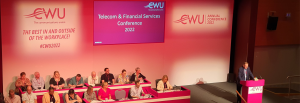Postal & T&FS highlights from this year’s conference
Union Matters April 28 2022
CWU to Royal Mail: ‘Get real on pay or we start national dispute procedure’
Day One of CWU Postal Conference kicks off with delegates voting unanimously to begin the process of triggering a national strike unless the company offers an acceptable pay deal ‘with no strings’…
Anger erupted at Annual Conference this morning when deputy general secretary postal Terry Pullinger outlined the details of an ‘insulting’ pay proposal that Royal Mail chiefs set out to the union at their last meeting.
Before revealing the offer, Terry explained that both the union and the company had jointly agreed to keep the discussions confidential while talks proceeded, but that Royal Mail had reneged on this agreement and had gone public on their position several days ago.
“It was not us who broke the ‘closed meeting’ protocols,” he said, “so I’m going to tell you the full offer,” adding that the offer was not the straightforward pay rise that the union had sought.
The company had offered 3.5 per cent on basic pay and applicable allowances, he began, but added that this already low pay offer did not include Royal Mail Fleet or Parcelforce members and that it came with various conditions, or ‘strings’ attached.
This 3.5 per cent consisted of 2 per cent upfront – on the basis of agreement to these ‘strings’ – and the remaining 1.5 per cent was offered “subject to moving forward on things they’re asking us to agree,” he explained, adding that there was also “anything up to £500 linked to productivity and the sale of allowances and, listing some of the company’s other conditions, Terry noted that Royal Mail also want the introduction of annualised hours, longer outdoor delivery spans and new, lower, pay rates for new recruits.
The CWU senior negotiators had, Terry reported, rejected the offer, saying: “We weren’t having what they were proposing, we rejected it on the spot.”
As well as the unacceptability of the offer itself, and in the context of the current cost-of-living crisis affecting the whole country at this time, our DGSP also sharply criticised the delay that such a complex set of proposals would take to negotiate, saying that “our members are having their pockets tested now and they need and deserve a no-strings pay deal now,” but Royal Mail were “trying to instigate talks that will take months.”
The broad areas covered by the various conditions that the business want to attach to this year’s pay settlement were already being addressed within the comprehensive Pathway to Change national agreement, Terry continued, highlighting the irrationality of Royal Mail’s current stance and that, taken together, the company’s overall positioning was a clear indication that it was attempting to undermine the national agreement itself.
“This is an attack on our agreements and on our members,” he said, describing management’s attitude and approach as “a disgrace” and condemning the huge amounts of money that had been paid out to private shareholders out of profits made by CWU members working throughout the pandemic.
“Look at what our people have done to serve the public and take this industry forward,” he said, contrasting this to the company leadership, who he accused of wanting to “smash it to pieces and fill their pockets with gold.”
The emergency motion gives Royal Mail until the end of next week to change its attitude, stating that:
‘If an acceptable agreement is not in sight by the end of week commencing 2nd May 2022, then a national disagreement will be registered.’
In accordance with legally binding dispute procedures within the industry, if no resolution is achieved one month after formally registering a national disagreement, the union will then commence a statutory strike ballot.
Terry told the hall that members were right to be angry about this pay proposal and cited the similarities between this attack on Royal Mail workers and the situation being faced by our Post Office members and also our BT/Openreach members, to whom he expressed full solidarity.
He also reaffirmed to delegates that this dispute was about pay and pay alone and that issues proper to the Pathway to Change agreement will be dealt with in separate negotiations.
The union was now facing a “massive challenge” and conference delegates, if they passed the motion, needed to be ready to go back to their workplaces and prepare to win another national strike ballot.
“I’m hoping you’re angry and that you’ll take that anger back with you,” he said, spelling out the organisation and campaigning that the union would be committing itself to with this resolution.
“We have to fight with everything we’ve got,” he concluded, to rousing applause and a standing ovation.
Outdoor secretary Mark Baulch came to the rostrum equally angry, reminding delegates of the exceptional service they had provided during the pandemic and of how this pay offer had disrespected and insulted them.
“Our members were a crucial part of the nation’s fight against Coronavirus and they should be congratulated and rewarded, not insulted,” he said adding that, form the way companies were treating workers at this time, saying: “When you think back to all the clapping of key workers and the banging of saucepans etc, it sometimes seems these companies are acting like it all never happened.
“This motion’s all about making sure our members are properly recognised for all that and to make sure they can cope with the cost-of-living crisis now.”
Urging the hall to send the strongest possible message to the company and a rejection of its proposal, Mark said: “We’re not going to stand for it and I know you’re not going to stand for it. Let’s pass this motion and then get out there and do the work.”
T&FS Conference opens in determined mood
Telecoms & Financial Services delegates start their proceedings with a robust message on pay and defending workers…
Opening T&FS conference this morning, President Karen Rose jumped straight into describing the lessons of the last two years. While admitting that “no doubt, the past two years have seen us lose recruitment opportunities”, she also spoke of the “alternative engagement options” learnt during the first period of the pandemic, including “new tried and tested methods” of contacting and mobilising workers.
“Facing many significant challenges”, she said, “employers will take advantage of the economic climate to attack wages and conditions” and pointed out that the next few months will see “important decisions to make” as the cost-of-living crisis deepens.
Following her shortly afterwards was deputy general secretary T&FS Andy Kerr, who spoke of how our key worker members “went out during the worst of the crisis and played a major part in keeping the country going”. He also described how the pandemic has “forced us to modernise in communicating with members”, making a situation where we “work quicker and smarter” with members from online outlets, and saving union funds.
Describing various campaigns across the board, Andy reminded delegates that “all disputes are inextricably linked”, urging for “strength in the face of hostile employers” by growing membership and increasing the capacity of reps, and urging members to remember that “the real enemy is the bosses”.
After dealing with motions as diverse as ensuring encouraging BT to take national waste and disposal management seriously, tackling rigid workplace cultures and encouraging employers to look at new hybrid working models, delegates also voted to support VMO2 members, who rejected a 3 per cent (starting April 2022) pay increase and a 2 per cent (starting April 2023) pay increase by 95.7 per cent in a consultative ballot.
Now, the members’ national team is mandated to consider all options – including industrial action – to win a better pay deal.
Speaking to delegates, national officer Tracey Fussey said that the union “will not sit idly by as our members are handed a pay deal that sees their living standards go backwards”, and especially while it took in over £10 billion in revenue during the 2021 financial year. “We are one union,” she said, “and in this room we know what trade unionism means – standing together.”



